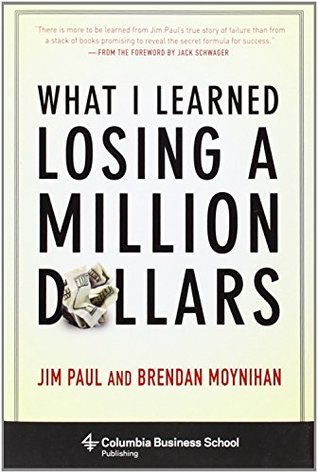More on this book
Community
Kindle Notes & Highlights
The foregoing paradox is one that I believe has a satisfactory answer. Trading, as far as I know, is the only endeavor in which the rank amateur has a 50/50 chance of being right. Why? Because there are only two things you could do in trading: you can buy or you can sell. And, as a consequence, some portion of clueless beginners will get it right simply by chance—for a while. This potential for temporary success by pure luck beguiles people into thinking that trading is a lot easier than it is. The potential for even temporary success doesn’t exist in any other profession. If you have never
...more
Success can be built upon repeated failures when the failures aren’t taken personally; likewise, failure can be built upon repeated successes when the successes are taken personally.
Personalizing successes sets people up for disastrous failure. They begin to treat the successes totally as a personal reflection of their abilities rather than the result of capitalizing on a good opportunity, being at the right place at the right time, or even being just plain lucky. They think their mere involvement in an undertaking guarantees success.
Herb Kelleher, CEO of Southwest Airlines: “I think the easiest way to lose success is to become convinced that you are successful.”
For instance, in Manias, Panics, and Crashes by Charles P. Kindleberger we find the Minsky Model: (1) Displacement—some exogenous event (war, crop failure, etc.) shocks the macroeconomic system. (2) Opportunities—the displacement creates profitable opportunities in some sectors of the economy and closes down other sectors. Investment and production focuses on the profitable sectors and a boom is underway. (3) Credit expansion—an expansion of credit feeds the boom. (4) Euphoria—speculation for price increases couples with investment for production/sale.2
If you occasionally break the rules and still have an unbroken string of successes, you are likely to compound the problem because you assume that you are better than other people and above the rules.
You must pick the loss side first. Why? Otherwise, after you enter the market everything you look at and hear will be skewed in favor of your position. For example, if someone has a long position and you ask him what he thinks about the market, is he going to tell you all the reasons why it should go down? Of course not. He’s going to tell you all the reasons why it should go up. Another reason controls should precede strategy is that, as we learned in chapter 7, you can’t calculate the probability of a trade’s being profitable; you can only calculate your exposure. So all you can do is manage
...more
But if you try to bluff the market by staying in a losing trade and it comes back and turns into a profit, what have you learned? You have learned that doing the wrong thing pays off, which means you will try to bluff again. The problem is: you won’t be able to distinguish between the times when it’s safe to break the rules and when it’s not.
The formula for failure is not lack of knowledge, brains, skill, or hard work, and it’s not lack of luck; it’s personalizing losses, especially if preceded by a string of wins or profits.


